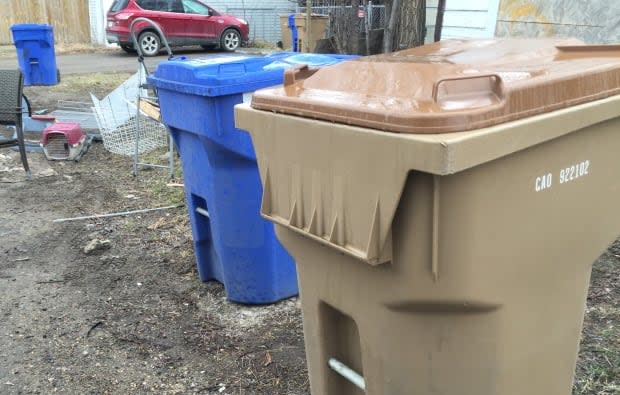Regina, Saskatoon councils debate low-income subsidies for waste collection

The municipal governments of Saskatchewan's two largest cities are grappling with how best to help low-income earners afford waste pickup services.
On Monday, the City of Saskatoon's standing policy committee on environment, utilities and corporate services voted in favour of a low-income subsidy program for garbage collection, stemming from recommendations made by a city administration report.
"This [report] really allows us to dig into this as a council and as a city, and really lay out a path for how we can create that access," said Coun. Hilary Gough, vice-chair of the committee, during Monday's meeting.
Starting in 2024, Saskatoon residents will pay for garbage pickup and organics collection through a user fee, instead of property taxes. Curbside recycling is already a utility payment.
The switch would mean all residents pay the same rate for those services, so city administration was directed last year to explore how to ease the resulting financial burden on low-income households.
On Monday, administration laid out five potential affordability options. It recommended, however, that the city implement a phased-out transitional rebate, starting in fiscal 2024, before adopting a universal low-income subsidy program for fiscal 2027.
"As a phase-out, it might make sense from a standpoint of less shock to the people as the program may be moved out," said Mike Jordan, the city's chief public policy and government relations officer, after presenting the report.
The transitional rebate, which no other jurisdictions are using, would benefit households whose income levels are below the low-income cut-off after taxes, the administration's report says. A person or family is below the low-income threshold if they spend at least 20 percentage points more of their after-tax income on necessities — clothes, food and shelter — than the average person or family, according to Statistics Canada.
The cut-offs vary by family size and the size of the community in which they live.
In 2020, the cut-off for someone living in Saskatoon — a city with about 270,000 people — was $18,656 after taxes. For a family of four, the cut-off was $35,274 after taxes, according to StatsCan.
The average cost for solid waste pickup in Saskatoon would be about $23 per month, according to estimates in administration's report.

Administration recommended that the city provide people below the low-income threshold with a waste utility credit of $100 in fiscal 2024. The credit would decrease to $75 in 2025, then drop to $50 in 2026.
In fiscal 2027, the rebate would make way for a universal subsidy program that would allow people to apply for an array of subsidized city services — not just waste collection.
Mayor Charlie Clark, however, moved that the transitional subsidy be fixed, giving low-income households a $75 credit for each of the three fiscal years before the universal program starts.
"If we're trying to address the ability to pay, I don't see people's ability to pay improving in that three years," Clark said. "If that's the purpose, providing it as a fixed amount makes more sense than having it as a reduced, phased amount."
The committee voted unanimously in favour of the change.
It also voted for city administration to report back with more information about the scope and timelines for the transitional rebate, including costs, and for administration to develop a council policy detailing principles and objectives with regard to user fees and subsidies.
Regina council to reconsider low-income rebate
Meanwhile, Regina's city council is set to reconsider its stance on cutting low-income households a break on garbage pickup services.
On Oct. 26, council voted to move all costs of curbside garbage, recycling and yard waste services to a user fee, with pricing based on the size of the garbage cart. The decision means Regina residents will see fees for such services appear on their utility bills starting in 2024.
Council also voted in favour of a fixed utility rebate that would be applied to all households with a waste/water utility account that are considered to be low income. This went against city administration's recommendation that a rebate only be applied to seniors and people living with a disability who meet the low-income threshold.
Several councillors voted against the motion, including Ward 2 Coun. Bob Hawkins, who wants to revisit the affordability issue, according to a notice of motion.
In the notice of motion, Hawkins suggests the change to the rebate will cost the city about five times more — or about $7 more per year for each user — and that it could lead to confusion because it is inconsistent with the water utility rebate.
Hawkins moves that council reverse its decision.
Regina city council will revisit the topic at a later date.


